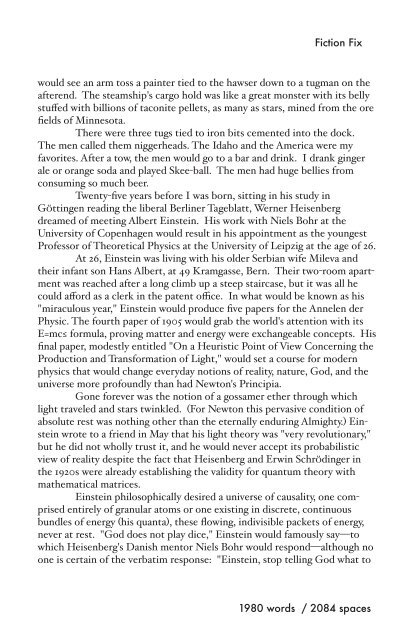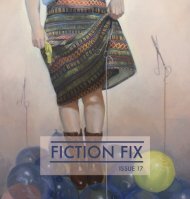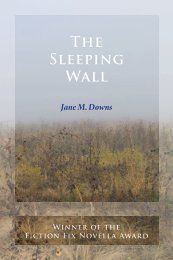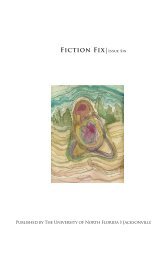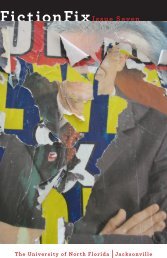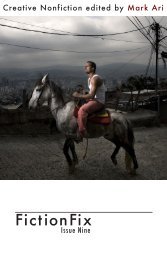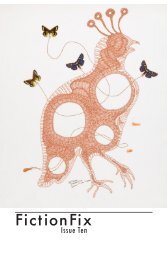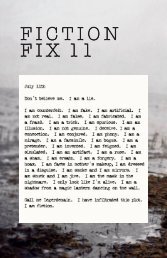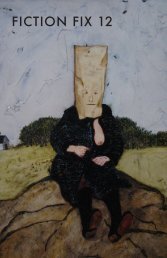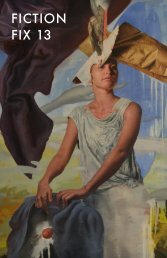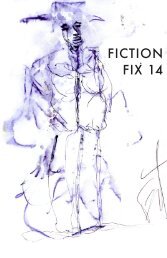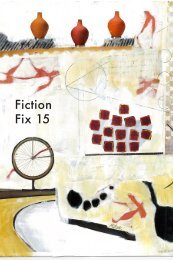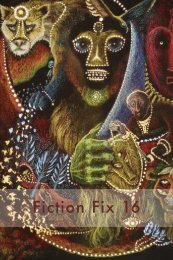Fiction Fix Eight
You also want an ePaper? Increase the reach of your titles
YUMPU automatically turns print PDFs into web optimized ePapers that Google loves.
<strong>Fiction</strong> <strong>Fix</strong><br />
would see an arm toss a painter tied to the hawser down to a tugman on the<br />
afterend. The steamship's cargo hold was like a great monster with its belly<br />
stuffed with billions of taconite pellets, as many as stars, mined from the ore<br />
fields of Minnesota.<br />
There were three tugs tied to iron bits cemented into the dock.<br />
The men called them niggerheads. The Idaho and the America were my<br />
favorites. After a tow, the men would go to a bar and drink. I drank ginger<br />
ale or orange soda and played Skee-ball. The men had huge bellies from<br />
consuming so much beer.<br />
Twenty-five years before I was born, sitting in his study in<br />
Gttingen reading the liberal Berliner Tageblatt, Werner Heisenberg<br />
dreamed of meeting Albert Einstein. His work with Niels Bohr at the<br />
University of Copenhagen would result in his appointment as the youngest<br />
Professor of Theoretical Physics at the University of Leipzig at the age of 26.<br />
At 26, Einstein was living with his older Serbian wife Mileva and<br />
their infant son Hans Albert, at 49 Kramgasse, Bern. Their two-room apartment<br />
was reached after a long climb up a steep staircase, but it was all he<br />
could afford as a clerk in the patent office. In what would be known as his<br />
"miraculous year," Einstein would produce five papers for the Annelen der<br />
Physic. The fourth paper of 1905 would grab the world's attention with its<br />
E=mc≤ formula, proving matter and energy were exchangeable concepts. His<br />
final paper, modestly entitled "On a Heuristic Point of View Concerning the<br />
Production and Transformation of Light," would set a course for modern<br />
physics that would change everyday notions of reality, nature, God, and the<br />
universe more profoundly than had Newton's Principia.<br />
Gone forever was the notion of a gossamer ether through which<br />
light traveled and stars twinkled. (For Newton this pervasive condition of<br />
absolute rest was nothing other than the eternally enduring Almighty.) Einstein<br />
wrote to a friend in May that his light theory was "very revolutionary,"<br />
but he did not wholly trust it, and he would never accept its probabilistic<br />
view of reality despite the fact that Heisenberg and Erwin Schrdinger in<br />
the 1920s were already establishing the validity for quantum theory with<br />
mathematical matrices.<br />
Einstein philosophically desired a universe of causality, one comprised<br />
entirely of granular atoms or one existing in discrete, continuous<br />
bundles of energy (his quanta), these flowing, indivisible packets of energy,<br />
never at rest. "God does not play dice," Einstein would famously say—to<br />
which Heisenberg's Danish mentor Niels Bohr would respond—although no<br />
one is certain of the verbatim response: "Einstein, stop telling God what to<br />
1980 words / 2084 spaces


